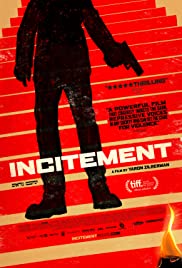
INCITEMENT
Israel, 2019, 125 minutes, Colour.
Yehuda Nahari, Amitay Yaish Ben Ousilio, Anat Ravnitzki, Yoavl Levi, Daniella Kersetsz, Sivan Mast.
Directed by Yaron Zilberman.
Incitement was an Israeli nominee for consideration for the Oscar for Best Foreign Language Film. It deserves the nomination as well as awards that it won in Israel.
This is an important film for an Israeli audience, and important for a worldwide audience who is interested in the history of Israel, the 1990s peace talks in Oslo, dialogue with the Palestinians, the role of Prime Minister Rabin and of the PLO leader, Yasser Arafat. It is significant about the mainstream of Israeli thinking, conservative attitudes and animosity towards the Palestinians, the building spread of the settlements, compared with more “secular� Israelis and Jews around the world who are open to negotiations, to a two state country. But, it is also illuminating in its dramatising of the attitudes of extremists in Israel, especially amongst Orthodox Jews.
To that extent, while it does give some background to characters and events, the impact of the film depends on audience knowledge of the events and the atmosphere around them. For those who know the film will end in assassination, this is an opportunity to try to understand why. For those who do not know about Rabin’s assassination, it will be is a very strong suspense story.
And, for a film of 2019, it looks back on the presence of Benjamin Netanyahu, his criticisms of the peace talks, his coming to power after the death of Rabin, his constant presence for almost 25 years in leadership in Israel, his friendship with the United States, especially in the Trump era, the development of settlements, animosity towards Iran but peace deals with Arab countries.
The film is actually a portrait of Yigal Amir, the man who shot Rabin. We see him as a 24-year-old, from an Orthodox family, his father a student of Torah but interested in negotiations, his mother a rather dominating woman, fostering her son’s ambitions, with animosity towards Palestinians. He is at the University studying law. He has a romantic attachment to a young woman who finds him to overpowering.
He is against any dialogue with the Palestinians, going to sit at the feet of a number of rabbis and hearing their opinions, especially their interpretations of Torah and of philosopher from the Middle Ages, Moses Maimonaides, and the singling out in the literature of Informants and Pursuers, who are to be condemned, a legitimate use of violence against them. Rabin is designated as an Informant, and Pursuer.
The film shows Yigal Amir, his brother and friends, getting a stash of weapons from an old friend in the military, target practice, going to demonstrations and protests. His attitudes become firmly ingrained, willing to debate them, giving speeches, testing out the responses of rabbis.
The film shows his religious fervour, his ingrained political beliefs with theological background, his looking for cues to encourage him in his violent mission. And he does, tracking down Rabin, waiting for him, chatting to security, then emerging and shooting him.
The film and leaves the audience to consider the issues, the political and regional and religious situations in Israel, the impact of fanaticism.
1. The title? In the Israeli context? The 1990s? Subsequent history?
2. Audience knowledge of the characters and events? The 1990s, peace talks, slow decisions, President Clinton? Rabin and Yasser Arafat? Orthodox Jews, hostility towards Palestine, peace talks?
3. The Orthodox Jews, life in Israel, homes, universities, meetings, Torah studies? The role of the rabbis? Interpretation Torah, of Moses my mid-90s? The issue of Informants? Pursuers? To be condemned as traitors? The legitimacy of violence?
4. The portrait of Yigal Amir? A convincing performance? Age, studying at the University, background, prospects, intelligent, religious studies, Orthodox? His place in his family, his father and the Torah, open to negotiations and peace? His strong mother, fostering her son’s ambitions? Anti- Palestine? Anti-Rabin? His sister, his friend wanting to marry her, her independence? The wider family and visits?
5. The insertion of actual footage of Oslo, the peace talks, those responsible, Washington, the Accord? Rabin and his speeches? The footage of Rabin at the site of the massacre? The insertion of footage of the assassination?
6. Yigal, his behaviour, his thinking, discussions, his brother, friends? The rallies against Rabin and their violence? The young people in rebellion? The response of the police?
7. Yigal, ideas, listening to the rabbis, his giving speeches, his friend in the military, getting the weapons, training? Becoming ever more militant?
Nava, the attraction, the discussions, meeting her family, the interrogation by her grandmother, Yigal’s response? The discussions with Nava, proposal, her walking away? Her marrying his friend?
8. Meeting Margalit? Her support, her rabbi relative? Yigal and his rabble rousing speech, looking at the reaction of the rabbi?
9. Yigal and his decision, taking off his religious shirt, the T-shirt, the weapons, mingling, talking with the police, standing by the van? Rabin coming down, Yigal shooting him?
10. The response to the film in Israel? Awards? Oscar nomination? The response of Jews around the world? The response of the Orthodox? A film trying to understand the mentality of the Orthodox in the 1990s, leading to assassination? And Benjamin Netanyahu in the forefront, his speeches, his attitude towards Palestinians, the peace talks, his election and his continued presence in leadership in Israel?